Trump pauses some tariffs; markets skyrocket
And Greece comes to a standstill amid a nationwide strike.
US President Donald Trump. Photo: Gage Skidmore
And Greece comes to a standstill amid a nationwide strike.
US President Donald Trump. Photo: Gage Skidmore
Happy Thursday and welcome to your morning wrap of the latest business and political headlines around the world.
First up, US President Donald Trump has hit pause on most new tariffs, with the exception of China, in a move that has caused financial markets to sky rocket.
A short time ago, Trump posted on his Truth Social social media platform to say there would be a 90-day pause on so-called reciprocal tariffs and a reduction on tariffs on all countries to 10%, except for China.
The duty on China will increase to 125% from the 104% tariff rate that kicked in yesterday, after China raised its duties on US imports to 84%.
“At some point, hopefully in the near future, China will realise that the days of ripping off the USA, and other countries is no longer sustainable or acceptable,” Trump posted online.
Members of Trump’s administration have lauded the move, with the likes of US Treasury Secretary Scott Bessent saying this was the president’s strategy “all along”.
But some Democrats said the move was in response to the sharp downturn in financial markets caused by the tariffs.
“TRUMP RETREATS ON TARIFFS BECAUSE OF TRUMP SLUMP,” Senator Chuck Schumer posted on X.
Financial markets have taken off on the news, with the Dow Jones up 6.8%, the broader S&P500 up 8% and the tech-heavy Nasdaq up 10%, early New Zealand time.
“Given how depressed stock prices and sentiment had become, the 90-day pause is sparking a violent rebound, and delaying implementation certainly removes a giant overhang from the market,” Vital Knowledge Media president and former JP Morgan Chase director Adam Crisafulli told CNBC.
The likes of Bitcoin has also surged, up as much as 7.7% to US$82,601.

In other news, at least 23 people have been killed in Northern Gaza by an Israeli airstrike that hit a residential building, The Guardian reported.
The Israeli military said the strike targeted a senior Hamas militant.
According to the United Nations, nearly 400,000 people have been forced to leave their homes or shelters since Israel decided to abandon a two-month ceasefire with Hamas, cutting off aid, food, and fuel.
To Germany, where Reuters reported that conservatives under Friedrich Merz have clinched a coalition deal with the centre-left Social Democrats, with the aim of reviving growth in Europe’s largest economy.
The deal ended weeks of negotiations between chancellor-in-waiting Merz and the Social Democrats, after he failed to secure a majority in February’s elections. It also comes at a crucial time for the country, as it contends with the escalating trade conflict with the United States.
"The key message to Donald Trump is Germany is back on track," Merz said at a press conference with his coalition partners, promising to ramp up defence spending and boost the competitiveness of the economy.
The new coalition plans to cut taxes for middle-class and lower-class workers, reduce corporate tax, lower energy prices, support the electric car industry and scrap a disputed supply chain law.

Friedrich Merz.
Moving south to Greece, a nationwide general strike has disrupted public services across the country, Al Jazeera reported. It has left ferries tied up in port, flights grounded, and public transport running only part time, as Greece’s two main labour unions, covering the public and private sectors, push for higher wages to cope with the rising cost of living.
“Our confederation’s wage demand is to bring back collective wage bargaining. Before 2012, half of Greek workers had collective wage agreements. But there was also a national wage agreement signed by employers and unions, which meant more than 90% of workers enjoyed maternity leave,” General Confederation of Workers spokesperson Yiorgos Christopoulos told Al Jazeera.
According to data from the Greek Ministry of Labour, the average monthly salary was 10% lower than it was in 2010, in the early days of the Greek debt crisis.
Finally this morning, Chinese electric car marker BYD is launching its premium Denza brand in Europe, despite rising trade disruptions, CNBC reports.
The first model is set to arrive in European showrooms in the final quarter of 2025. BYD already sells electric cars into Europe, but the Denza brand, which it started with the Mercedes-Benz Group in 2010, aims to fulfill the luxury market.
The European Union announced a 17% tariff last year on BYD vehicles, claiming the company received “unfair” production subsidies. But last month, Chinese and EU officials discussed issues related to the EV supply chain in Beijing.